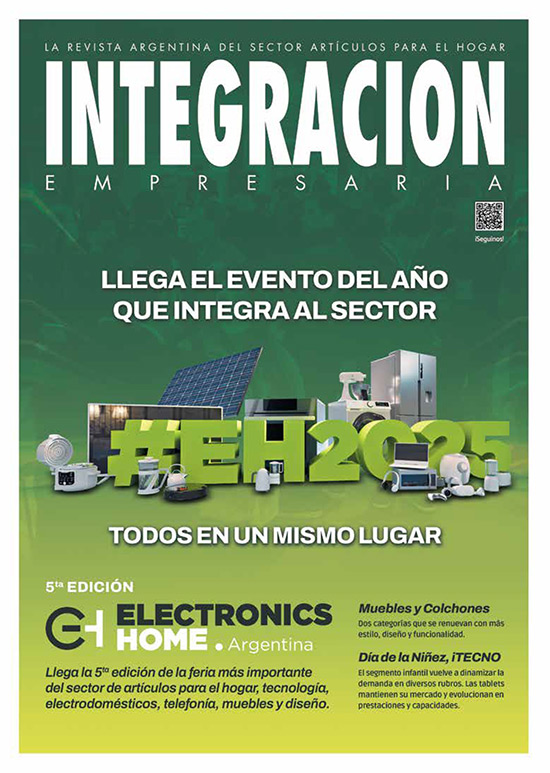Cameras

Companies, the crisis and the future
We analyze with Alejandro Iglesias, president of CaFed, and Carlos Cornejo, president of Cafagás, the impact of the current crisis and the fall of sales suffered by the sector.
Por Rodolfo Pollini
In March, 12 days after mandatory confinement, Came revealed that retail sales had fallen 48.7% and those of 51.5% appliances and electronic intelligently. Figures that anticipated what pandemic could cause in a market that came with great difficulties.
"For two years we have been selling half of what we sold," confirmed Carlos Cornejo, president of Cafagás. "We could never recover above that 50%. This speaks of the vulnerable of the sector and the Argentine economy."
From Cafed, its president, Alejandro Iglesias, acknowledged that the current fall was very strong from the beginning, because it was sold only online but that sale did not arrive, in some cases, 30% of the normal sale. "Last year he started with the expectation that he was going to grow, but ended with a very strong fall," he recalled.

Carlos Cornejo. President of Cafagás
The current panorama
The sector was no stranger to the almost paralysis of the country or to the search to save the accounts while only those who sold essential products were allowed to work. This favored the hypermarkets, which according to Iglesias were the ones who first started selling appliances, to remain open. "The problem was that to large products, such as frosts and washing machines, there was no way to transport them," he said. “This lasted until the online sale was authorized, but the small products had an advantage again until the freight for the largest were released. Except cell phones and computers, the rest it cost to start until the interior began to open, but the manufacturers or could not start or dispatched the stock we had had not to deliver. The interior had more advantages, such as in San Luis, Catamarca, Santa Fe or Córdoba.
Cornejo put the accent in the financial and in a certain supply of the channel, for what is sold online and, in part, to protect the working capital. "The last month there was a rebound because the stocks sold online had been consumed," he said. “The replacement was for the stocks consumed and the expectations of devaluation. There was a devaluation of the dollar from 60 to 80 pesos with the solidarity tax. External operations were limited because the problem of the bondists was not solved, but the free dollars left. When the pandemic began, the devaluation of the official and free exchange rate was accelerated but the Catch up was not made, because there were no dollars. Bonists, there will be no dollars and exporters do not settle at 50 pesos.
Credit
One of the problems that the country will face will be the recomposition of work assets, which will depend not only on the financial health of companies but also on that of consumer pockets.
"Without maintaining now 12 and now 18 it will be difficult to sustain the demand," Churches reasoned.
"The credit will exist, but who is going to pay it," Cornejo wondered.
The rebound and the future of online sale
According to the Chamber of Electronic Commerce (CACE), as of April 20, when the eCommerce was enabled, the billing of that channel grew 111%, with 54% more in purchase orders and 87% in units, comparing with an average fortnight of the first quarter. The trend deepened the sale of essential products and moved to electronic, where it increased 68% in billing; 54% in purchase orders and 53% in units. We need to see how much of this change was for love and how much for necessity.
"Things were ahead of me for 5 years," Cornejo said. “People's uses and customs will take long to change. The ABC1 segment, more culturally predisposed, will adapt faster to these changes.
Iglesias predicted the possibility that there are changes by both the retail and the brands. "It is possible that those who did not sell online do it and maybe with delivery through the retail, because people are encouraged to buy in this way."
The sector as a reflection of the country
"The products that we cannot stop having, such as a heater or a thermotanque, accompany the GDP and fall or rise in equal proportion," said Cornejo. Refrigerators and washing machines, which are not totally essential, multiply by two and recreation, such as televisions, by 4, but both up and down. Even so, multiproduct companies two years ago fell in half and never recovered. Today, the effect of monetary issuance is not noticeable in prices for recession, quarantine and because people have no money. If the restrictions were lifted there would be a rebound of inflation, but not so much. What is not known is what type of Leliq or Lebac the broadcast will be absorbed ”.
"Since this problem began, in Cofed we try to sustain sales and authorize plants to work, to generate income and cover fixed costs," Churches recalled. "Some companies are a little better than others, but we all suffer a fall in sales as it never existed. The concern of national manufacturers is to supply all the demand there, but we have a scenario with problems and companies that could not start because they could not supply supplies."

Alejandro Iglesias. Cofed President
The future
The next months are uncertain and at the same time the only thermometer to check how the economy, companies and retail will look. It is difficult to speculate with price wars, but of promotions, to recover participation in a smaller market.
"The first problem was to have sales, because opening the factories and not selling does not make much sense," Churches concluded. "While that sale began to move a bit due to unsatisfied demand, with the increase in the exchange rate there may be people who have pesos seek to stock up with a dollar that can continue to increase."
"Those who survive will adjust prices to a dollar of 105 pesos and those who have to sell will settle merchandise to get cash and see how they follow," Cornejo closed. "There will be a brutal pricing problem. There are already things that are priceless."
Take into account when analyzing data and figures in such a changing scenario, that this note was made in the week of June 1 to 5. At that time, both Cafed and Fedehogar, Cafagás and Afarte prepared to dialogue with the government in the search for palliatives for the crisis.
Latest news
Outstanding sector










